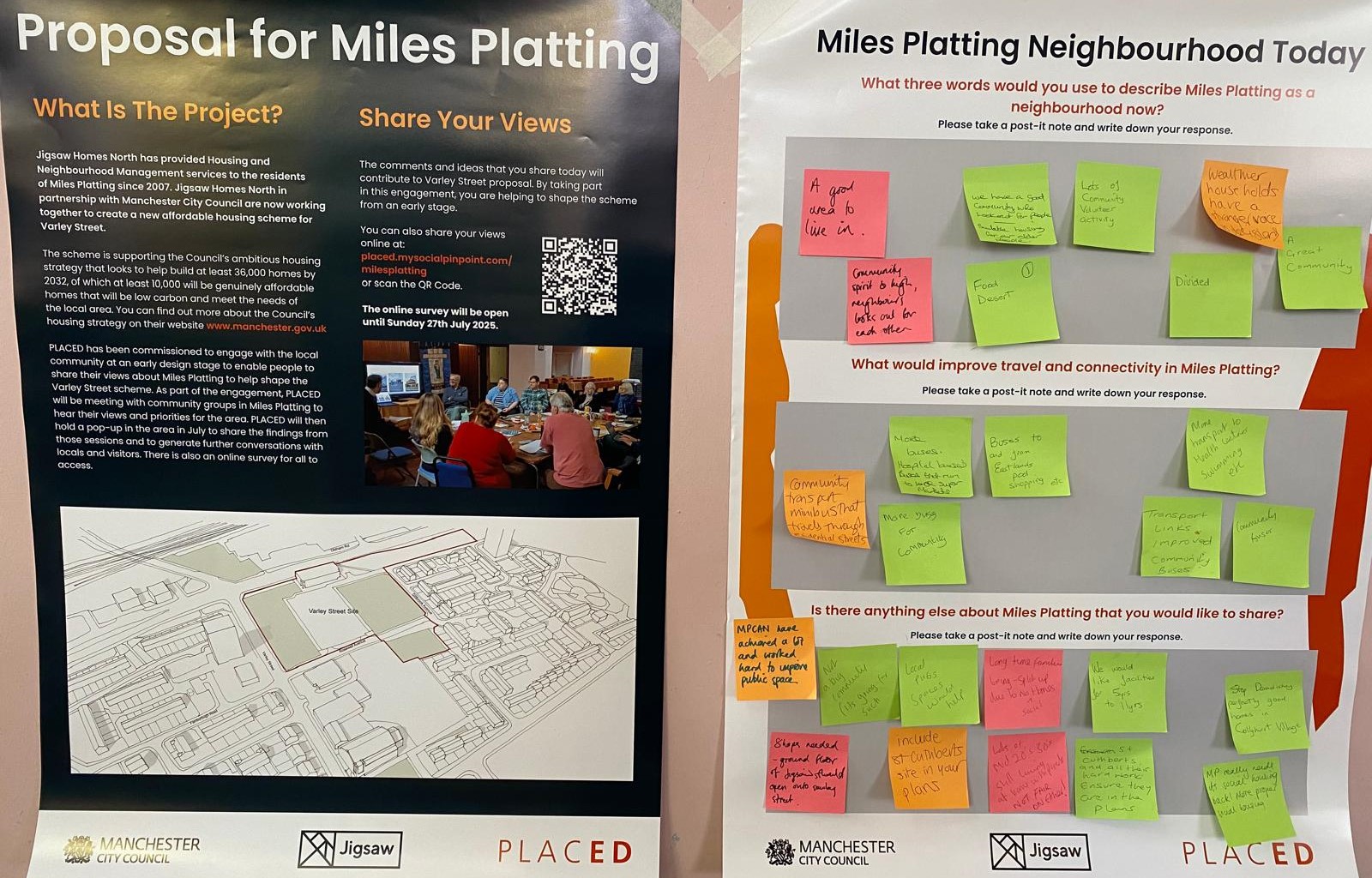Savers uniting from Middlesbrough to Wythenshawe!
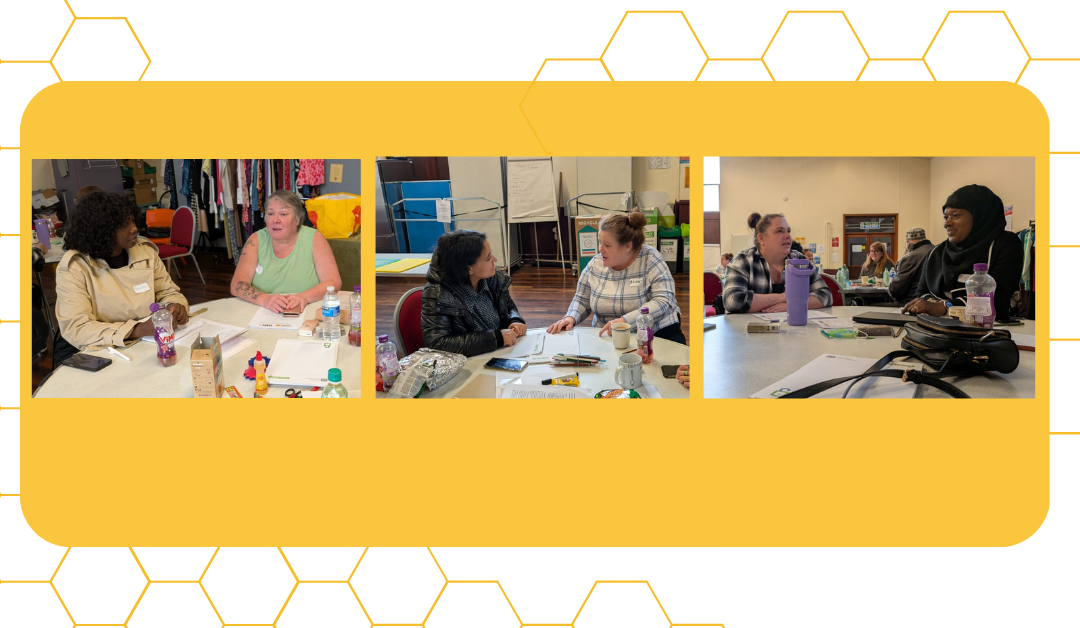
Community Savers leaders had another productive quarterly network meeting on Thursday and were delighted to welcome Rama, Fatima, and Mabintou from Middlesbrough!
Rama is coordinator for a CIO called Creative Minds Middlesbrough and is working with local women to learn from the Community Savers approach and set up their own savings group.
Leadership development, sharing learning and peer support are fundamental pillars of the Community Savers methodology and here Lina – a leader form Dandelion Savers and Wythenshawe Central Network shares on what Quarterly Network meetings are all about:
After a jam-packed morning full of Community Savers business affiliated savings groups from Brinnington, Miles Platting, Hulme and Wythenshawe shared their experiences of setting up and running savings clubs with our Middlesbrough guests. Bridget from MIles Platting Savers reflects on what she was able to share here:
Savings clubs are the building blocks of the Community SAvers approach and contribute significant impacts to financial and social inclusion and wellbeing. For example, our 2024 members survey revealed that:
· 85% of members feel more positive about life
· 81% feel less isolated
· 96% feel more community connection
· 96% saw improved mental health
Community Savers is about much more than saving money however. Through the savings clubs, local residents are able to come together to discuss local issues and soon begin developing their own local initiatives to address gaps and challenges.
Over time, the clubs become organising hubs for a wider network of groups and projects forming neighbourhood networks able to take collective action to reduce inequality and promote a better future for their local area.
For now though, Fathima, Rama and Mabintou will be focusing on getting the hang of getting their new savings club off the ground with support from a shared partner of Community Savers and Creative Minds Middlesbrough – Turn2us https://www.turn2us.org.uk/
Rama visiting from Middlesbrough talking about her experience of attending a Community Saver network meeting.
Fatima from Middlesbrough reflecting on the learning from the day.
Whose City? Whose Plan? Local Plan Consultation now open
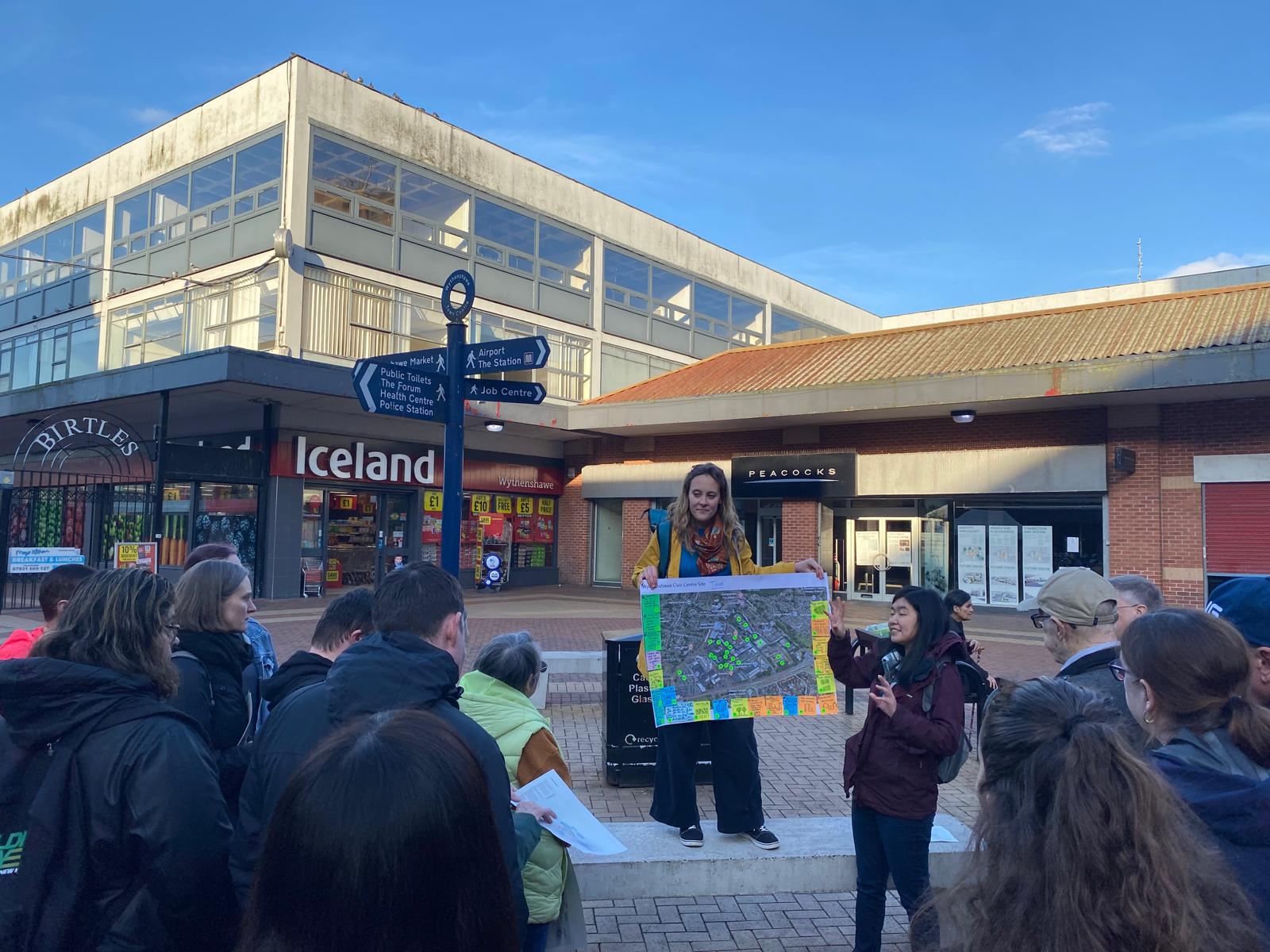
Manchester’s Draft Local Plan out for 10-week consultation
Manchester City Council released their draft Local Plan for a 10-week consultation period on Monday 22nd September. You can access the draft plan with full supporting documentation and submit a consultation response here.
The Council will be holding the following consultation events:
- Wednesday 22nd October, 4pm-7pm – Gorton Hub, 27 Garratt Way, M18 8HE. The hub is on Hyde Road at the junction with Whitewell Way.
- Tuesday 28th October, 4pm-7pm – North City Library, Rochdale Road, Harpurhey, M9 4AF.
- Wednesday 29th October, 3.30pm-7pm – Wythenshawe Forum, Forum Centre, Simonsway, Wythenshawe, M22 5RX.
- Thursday 6th November, 11am-2pm – Central Library, St Peters Square, City Centre, M2 5PD.
- Thursday 6th November, 4pm-7pm – Central Library, St Peters Square, City Centre, M2 5PD.
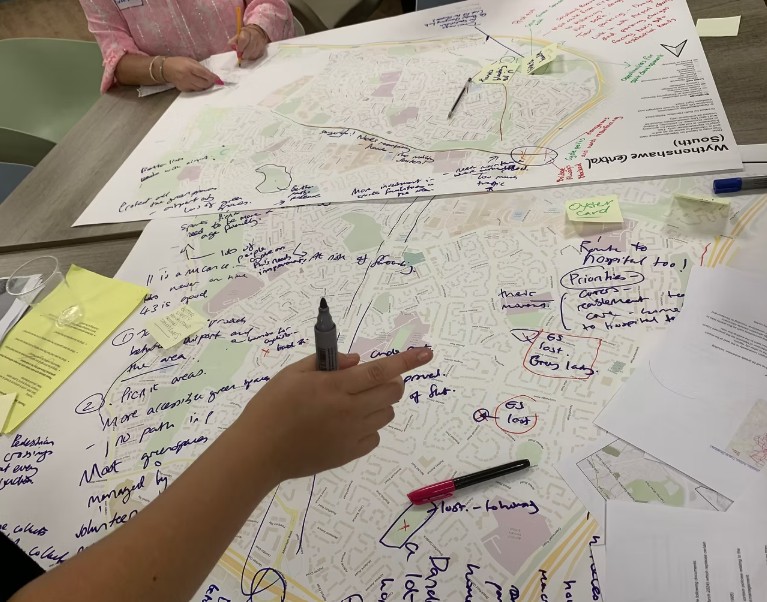
What is the Local Plan? Why should I care?
All Local Authorities must produce a Local Plan. Topics that Local Plans usually cover include housing, employment, green space, and retail. They also identify where development should take place in a city and where development should be restricted.
If you want a say in what can be developed in your local area and the city – you need to know about this!
Local Plans have a long life-span because they take so long to review each time. The last Local Plan in Manchester was published in 2012 and is still the current policy for the city. Some aspects of Planning are still determined by the Unitary Development Plan that was published in 1995!
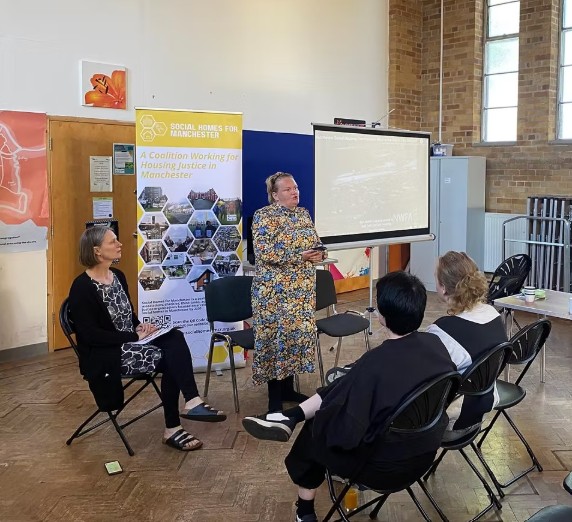
This new Local Plan is likely to continue to shape what kinds of housing (and other facilities) can be developed, and where, for at least the next 10 years.
Why is it so important for Manchester communities to submit a response?
Manchester is at the sharp end of the housing crisis in both availability and affordability. There has been a net loss of more than 16,000 social rent homes to Right to Buy alone since 1979. There are now approximately 20,000 households on the waiting list for a home in Manchester. From 2015 to 2023, the city experienced an 84% increase in the average house price paid and a 61% increase in the average monthly private rent (much higher than the England average). These increases far exceed the 18.7% growth in median hourly earnings in Manchester over the same period, contributing to a situation where 1 in 5 households in Manchester are living in fuel poverty.
While the new Local Plan does introduce some welcome increased targets for affordable housing and housing for social rent, it does not go far enough to address the housing crisis amidst a supportive national and city-regional political and funding environment where £39 billion has been invested in affordable and social housing of which SH4M have learned that approximately £2.5 billion will be invested in Greater Manchester.
It is also important to submit any objections to the plan now to be able to participate in later stages of the decision-making process. The process for passing the Local Plan into policy has several stages. After this initial consultation (called a Regulation 18 consultation) there will be a second version published which will also go out for consultation (a Regulation 19 consultation). Then there will be an Examination in Public.
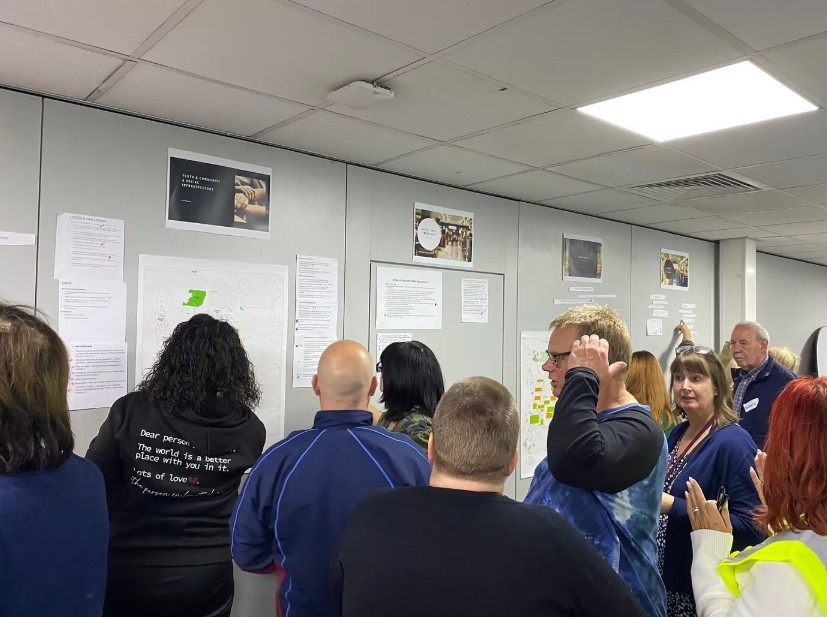
This is a chance for community representatives to address the national Planning Inspector directly at a public event. Only those who have submitted objections during earlier stages of the process will have the right to attend and speak at the public examination of the plan.
At the end of the process, the Inspector will make a recommendation on the Main Modifications required for the Local Plan to pass inspection and be adopted.
As an example, you can view clips from Days 1-5 of an examination of York City Council’s Local Plan from 2018 here. Notice all the white men in suits? This is not what we want to see in Manchester!
But what can I do, really?
This can all feel very technical. You have the power to work together with others and your local councillors to advocate for your community’s priorities for your own local area and for the city. SH4M can help.
Residents and community groups are coming together across the city, within their own neighbourhoods, and to join forces across neighbourhood boundaries, to share their priorities for the homes, communities, and the city they want to live in and co-create.
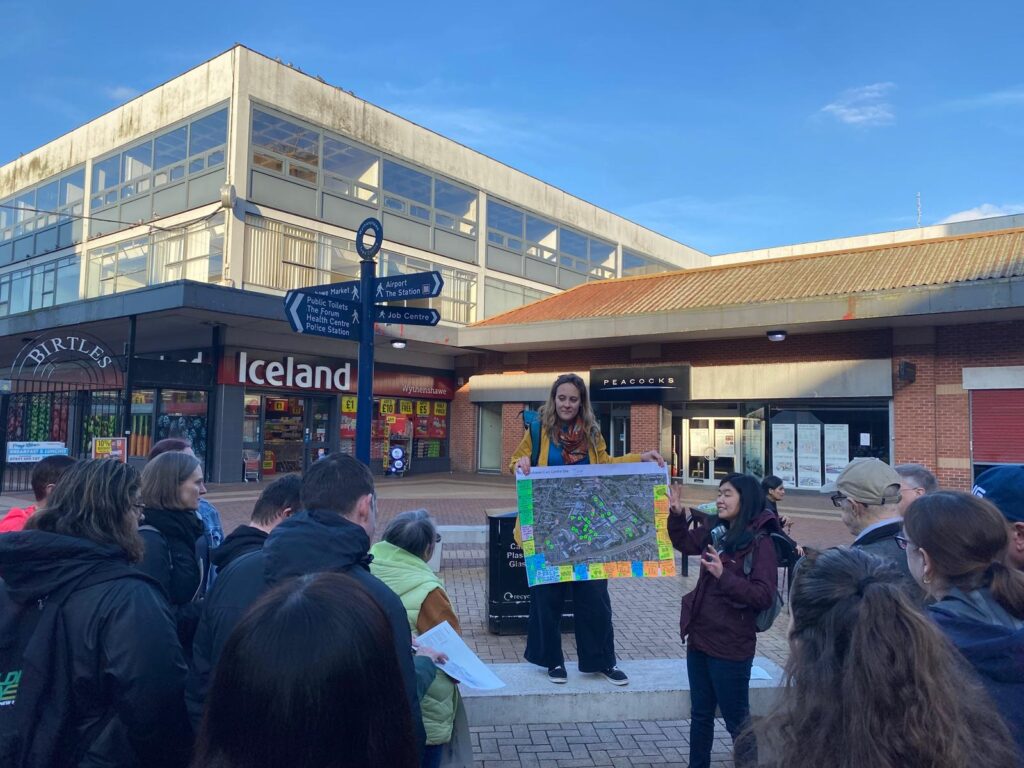
SH4M’s headline request is for Manchester City Council to include a minimum target of 30% social rent in all new housing developments of ten homes or more in the Local Plan. Research evidence tells us this is the minimum amount we need to address the housing crisis. This is possible to do. Other similar cities are setting targets of 40% and 50% social rent.
Here are some suggestions for how you can get involved and advance your own local priorities:
1. Join the campaign: you will receive information, calls to action, and updates on the process.
2. Invite us to run a workshop in your local area: socialhomes4mcr@gmail.com.
3. Engage your ward councillors: they may be interested to work with you to organise a local meeting to discuss priorities for your local area and represent these through a submission to the Local Plan Consultation when it opens.
4. Submit a response to the Local Plan consultation when it opens. There is more information on the MCC website here: https://tinyurl.com/2h7hc46c.
We will be publishing our own local plan consultation response on here soon. If you are signed up to the mailing list we will share this with you in case you would like to support similar asks in your own response.
Wythenshawe Central Network – Summer 2025 update
Wythenshawe Central Network (WCN) is a women-led neighbourhood forum, constituted in July 2024 to bring together residents and groups to develop a stronger, collective voice on local issues in Wythenshawe. WCN recently affiliated with Community Savers, and includes Dandelion Savers and Mums Mart amongst its membership.
WCN is a legacy of Women of Wythenshawe (WOW) – a three year women-led community action initiative focused on achieving place-based systems change on gendered poverty, funded by the Smallwood Trust. Diverse women’s groups from across the Wythenshawe area joined together to identify the most pervasive issues holding women in poverty locally. Leaders achieved impressive impacts on a range of issues including addressing the crisis in housing, special educational needs, and domestic abuse provision. Women’s groups identified the redevelopment of Wythenshawe Town Centre as a critical moment to ensure that the priorities of women, families and young people, including those with learning disabilities, are put at the heart of local decision-making.
From September to November 2024, WCN held three community workshops inviting residents to have open discussions and share their views. These were some of the top priorities:
- Maximise the percentage of social rent homes with provision for a diverse range of tenants, including people with disabilities, older people, overcrowded families requiring larger 3- and 4-bed homes, and women & children fleeing domestic abuse.
- Increase the availability and maintenance of better quality & accessible green spaces
- Affordable retail and leisure facilities & capped rental prices for local businesses
- Training, apprenticeships and job opportunities for young people
- A community transport system and increased parking spaces
- Increased health, welfare and social care provision to match the increased population
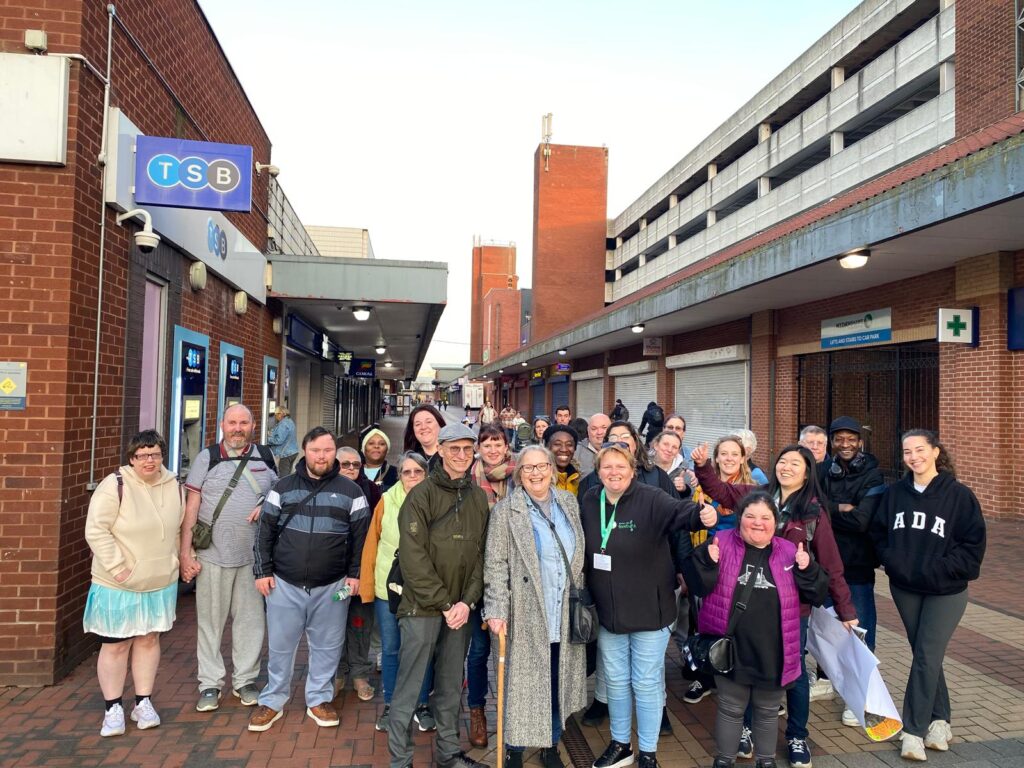
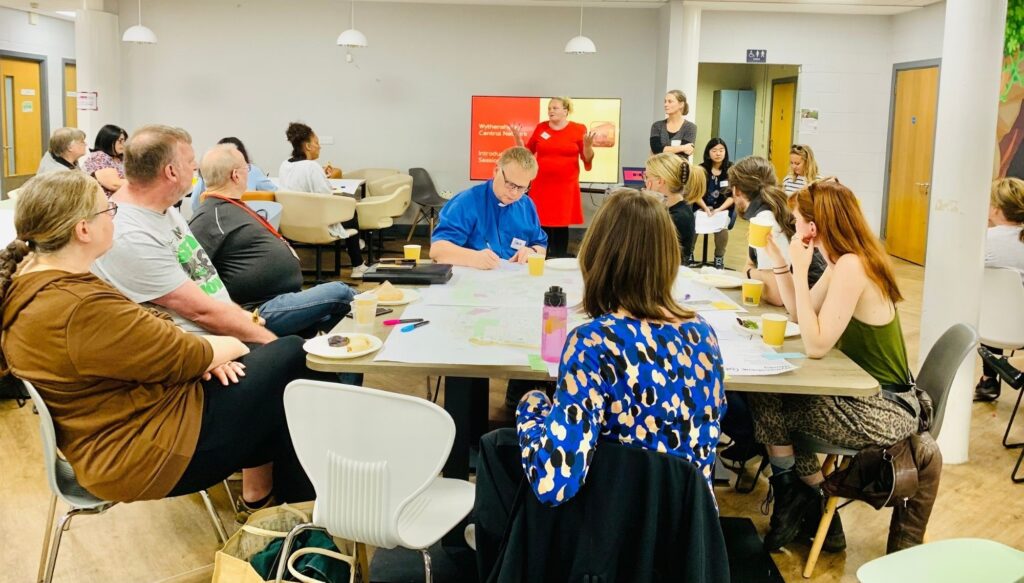
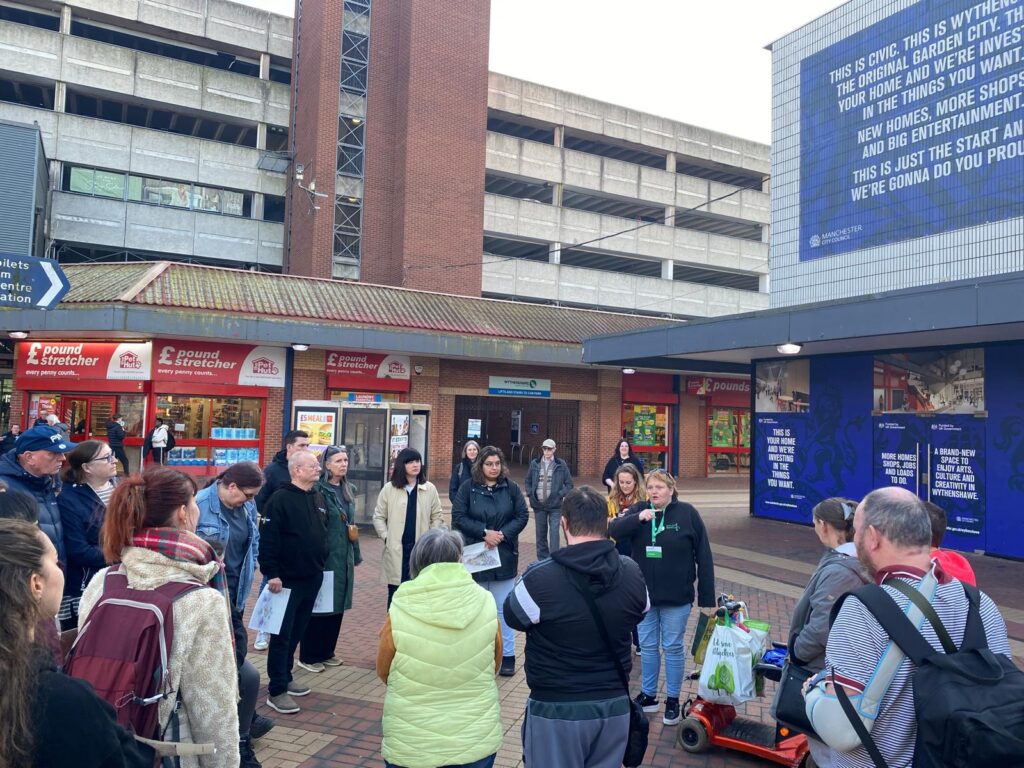
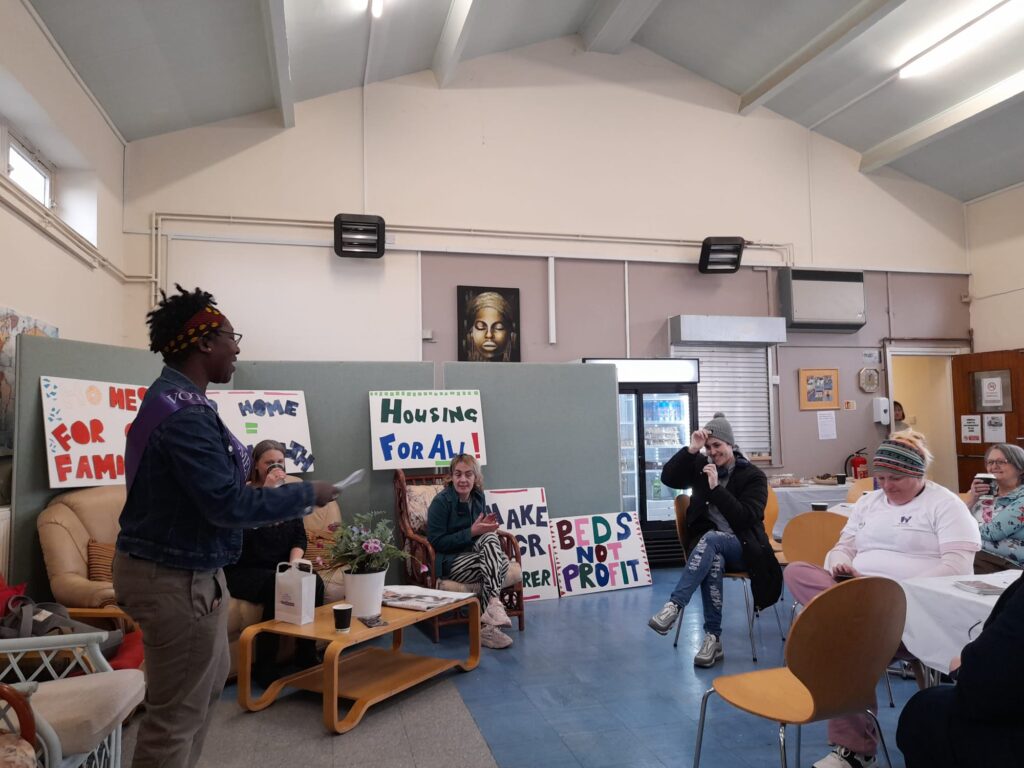
Manchester City Council and the appointed developer MUSE have agreed to meet with WCN leaders in August to listen to their priorities, including for a more inclusive and participatory development process. WCN members are working with urban design consultants to better understand how the development process works and advocate for meaningful community influence.
Wythenshawe Central Network now represents over 20 resident-led and user-led community groups and more than 100 local residents. And they are also working in alliance with Churches Together Wythenshawe who have 15 churches in their membership. WCN are committed to ensuring women, families and young people are at the heart of local plans, and people of all gender-identities and backgrounds are encouraged to get involved. Membership is open to all residents, groups and projects living, working or running activities in the Wythenshawe Central area – please email wythenshawecentral@gmail.com to find out more or if you wish to become a member. You can also sign up to the mailing list to keep informed about upcoming workshops and events.
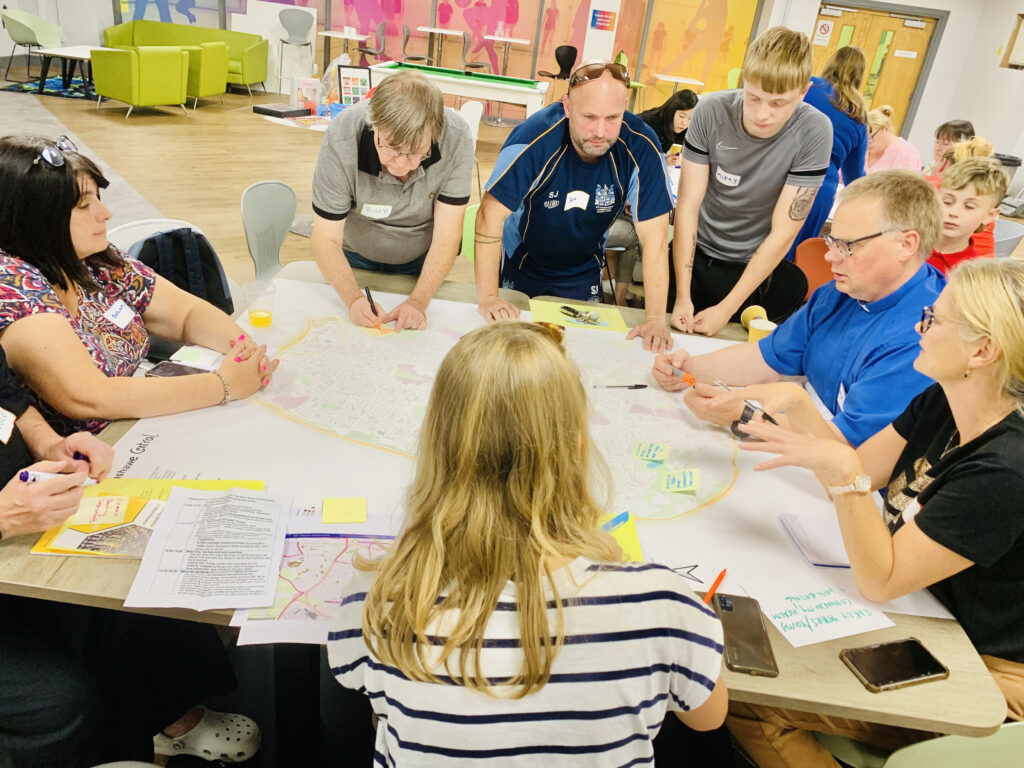
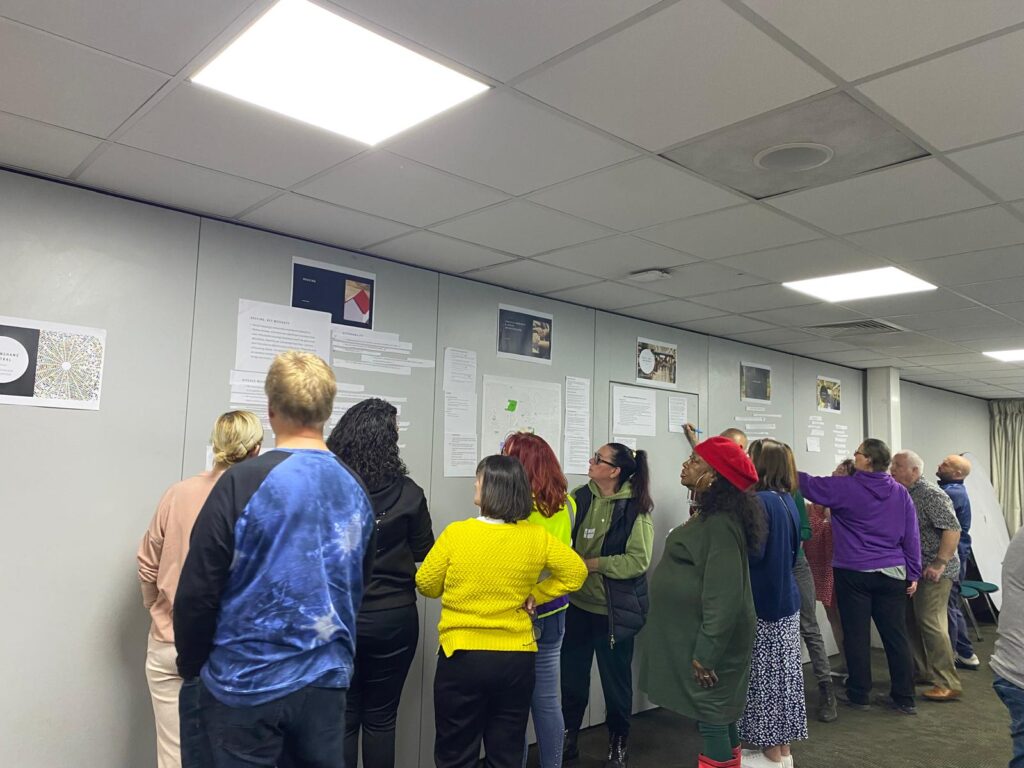
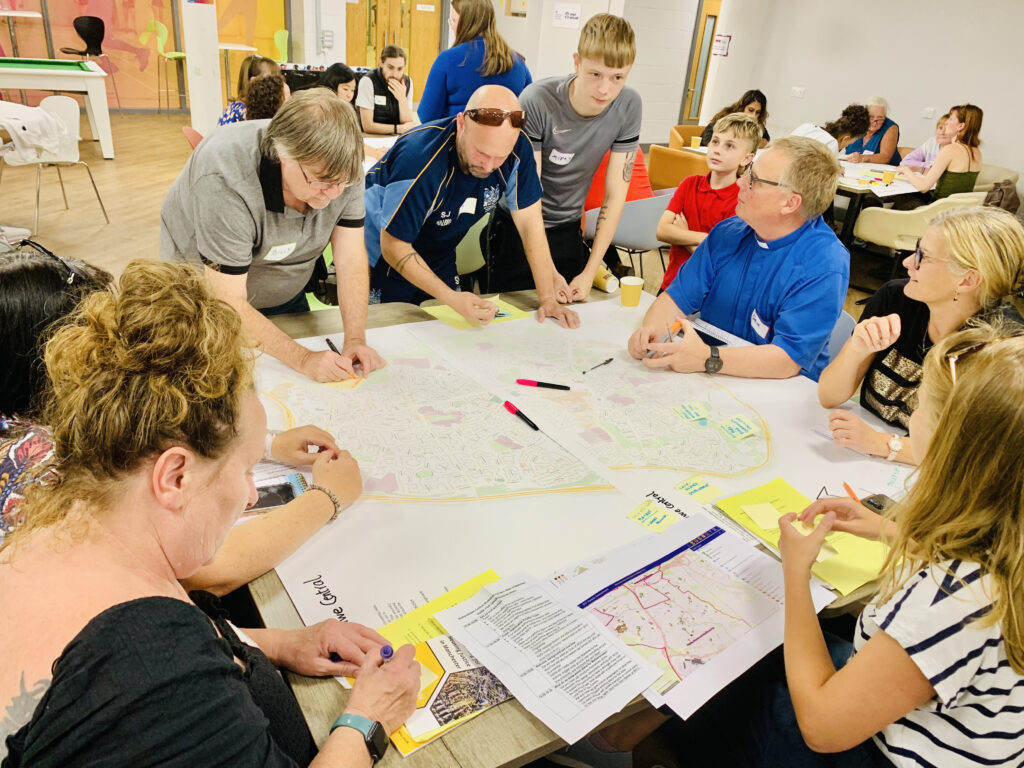

WOW! Celebrating Three Years of Women of Wythenshawe (2022-2025)
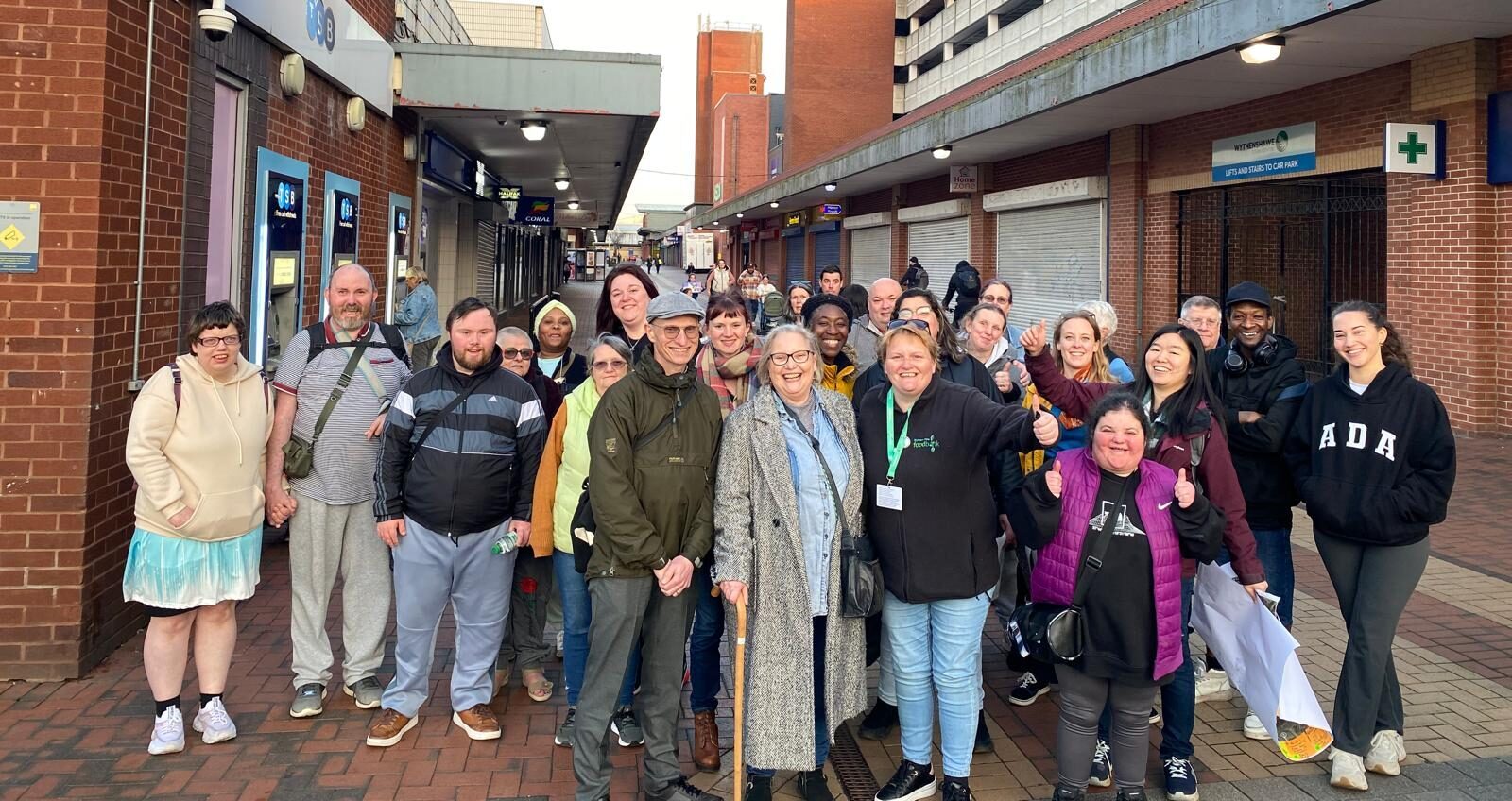
Women of Wythenshawe were out in full swing on Saturday evening to celebrate three years of hard work, personal and relational development and social change. The project has brought together nine local women’s groups to identify their priorities and take action on gendered poverty in Wythenshawe:
- Better Things Ambassadors
- Bright Futures Friends
- Dandelion Savers
- Know Africa
- Lifted Carers
- Mums Mart
- SEND Together
- Well Women
- Wythenshawe Women’s Welfare Association
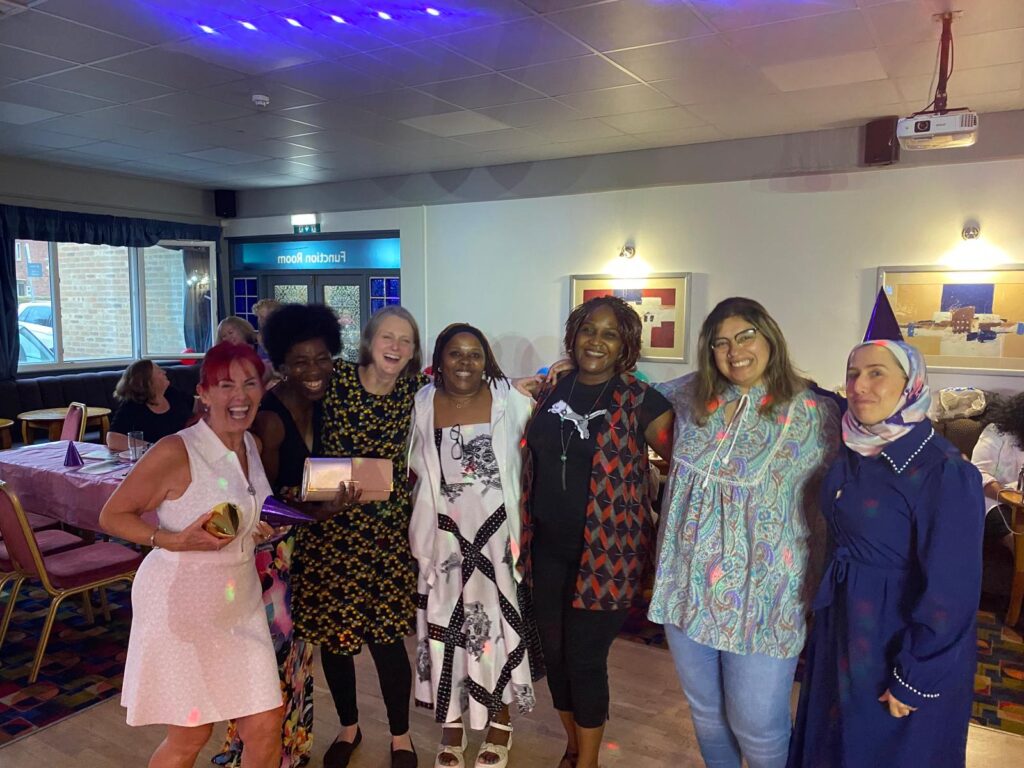
Members from across these groups initially engaged in a series of learning exchanges whereby the women leaders visited one another in their local community settings. Alongside storytelling workshops, learning exchanges, and a co-created skills-based training programme, and gradually sharing and recognising their common experiences, this has enabled women to build their confidence to work with each other, deepen their understanding of their common experiences, and develop strong solidarity relationships.
“Before participating in WoW I have never attended a meeting with lots of people. I was a shy person; and it increased my confidence. It helped me meet with other people without feeling nervous…I feel that individually I have really benefited from being part of the WOW Network, it has changed my life!” WoW Participant
WoW women formed action groups around three main priority issues for women living in poverty in Wythenshawe which they identified as requiring systems change; Domestic Abuse; the Housing crisis; and the system around Special Educational Needs support for children, parents and carers.
Domestic Abuse
The Domestic Abuse Action Group partnered with Wythenshawe Safespots, a survivor-led support charity based in Wythenshawe, and worked with On Our Radar to gather survivors’ experiences and create a series of videos for a specialist online training portal reflecting the diverse experiences of Wythenshawe women. The training portal covers ten different kinds of abuse and survivor testimonies reflecting on the support they received and what would have made a difference. The training is aimed at public sector workers across Wythenshawe, aiming to improve the support received by survivors and will be launched in September 2025.
SEND
Leaders from the SEND Action Group have been busy undertaking training in SEND Law, IPSEA Courses, Mental Health and SEND Awareness to develop their capacity and knowledge to support service-users within their local SEND support groups. Working with SENETA, they produced a series of ‘myth-busting’ videos aimed at parents and carers of SEND children to raise awareness and share knowledge across the Wythenshawe SEND community. They partnered with The Grange specialist school to undertake a Train the Trainer programme. Working through new and existing connections, leaders aim to deliver this training in Wythenshawe schools and raise awareness among teachers and staff members to increase appropriate levels of SEND provision.
“Learning about the current situation in schools and the experiences of people with disability, there are some similarities still to when I was going through the system and it is good to be working on trying to change it… I’d like to see more schools taking up the training we are working on from The Grange and also the Inclusion Quality Mark accreditation.” WoW Participant
Housing and Inclusive Development
Born out of the Housing Action group, the Wythenshawe Central Network is a constituted, neighbourhood forum currently with 20 organisational and 100 individuals across its membership. The network was formed amidst increasing local concerns about what was happening with the redevelopment of Wythenshawe’s Civic Centre. With support from urban design consultants, WoW leaders brought together local residents, community groups, civic and faith organisations through a series of community workshops and a neighbourhood walkabout with local councillors (header image) to map out their hopes, fears and priorities for Wythenshawe. The network has partnered with Churches Together Wythenshawe to advocate for a stronger local influence in decision-making processes and ensure the diverse needs of Wythenshawe’s community are reflected in plans to unfold.
“I’ve learned where to go, and who to approach, and what to say to the people that we are asking things from, whereas two years ago I wouldn’t have had a clue about any of what we are doing now. I’ve learned how to understand the jargon, how to approach things, how to be in the room with so many highly qualified people, but feel that I belong there which is very important because people like me don’t usually feel they belong in that room.” (WCN Committee member and member of the WoW Housing Action Group)

WCN are a key ‘local area team’ within the wider Social Homes for Manchester coalition who have just contributed to an increase in social rent housing targets for the city of Manchester from 5% social or affordable rents to 21% social rent.
Women-led Enterprise
Some women leaders have partnered with Flourish Together CIC to develop their skills and capacity and establish their own social enterprises. Bright Futures Friends are running outdoor learning activities, and exploring becoming incorporated to do SEND awareness training consultancy. Well Women and Know Africa leaders are hoping to set up catering enterprises and we had the pleasure of having their delicious food at our celebration party on Saturday!
It has been an amazing three years of learning, skills-development, challenges, achievement and growth for WoW women. Leaders have worked extremely hard and are keen to continue advocating for systems change on gendered poverty by working closely in collaboration with local councillors, partner organisations, and most importantly each other.
“Someone once said that unity is strength and that is certainly true of the Women of Wythenshawe project. Having the opportunity to be part of a hugely varied and diverse group of women, sharing experiences from different perspectives and experiences only makes this incredible group of women stronger in their pursuit of systems and policy change and in support and understanding of each other.” Wow Partner
A Big Step Forward

Social Homes for Manchester are pleased to announce that Manchester City Council (MCC) passed a motion last Wednesday 16 July to increase social and affordable housing targets in the city.
Moving away from the 2012 policy where only 5% of new housing developments of 15 homes or above had to be social or affordable rents; MCC have now voted for a new set of targets under which 21% of new housing developments of 10 homes or above must be social rent.
The original motion was brought by the Lib Dems after a Green Party amendment to a motion in February 2025 endorsing Social Homes for Manchester’s ask for 30% social rent was not agreed by council.
The new city policy will require 30% of all new housing developments of ten homes or more to be ‘affordable housing’ of which 21% should be social rent homes, a further 3% is to be Manchester Living Rent (which means within the Local Housing Allowance threshold), and 6% is to be low-cost home ownership options.
The new targets were a key focus of discussion at the Manchester Social Housing Commission on Thursday when Community Commissioners from Miles Platting, Hulme, Moss Side, and Wythenshawe thanked Executive Member for Housing and Development Cllr Gavin White and all elected members for listening to community concerns on the housing crisis:
“Last year when I walked in this room, I just thought no, it’s just going to be a load of talk, and nothing is going to change. But listening to the discussion around this table now, I just can’t thank you enough for all the hard work that you all do. Thank you on behalf of all the residents, and all the communities.” Zoe Marlow, Wythenshawe Central Network.
Councillor Gavin White said:
“We were pleased to see the council giving unanimous support for our view that 30% of our housing delivery should be affordable with 70% of this being for social rent. We all want to see more social, council, and genuinely affordable housing in our city, to tackle the housing and homelessness we face.
It has been good to engage with and listen to the social housing commission over the last year and ensure that our ongoing response and strategy as a council is truly ambitious to meet the needs of our city.
We are pleased to see the recent announcements by the Labour government of £39bn for new social and affordable housing over the next 10 years, with 60% of that being for social rent – we are already in discussions with government about how we can help with the accelerated delivery of these new social and affordable homes in Manchester.”
Next steps
The local plan with these revised targets and policies will be subject to an 8-week public consultation from mid-September 2025. While recognising this big step forward for the city in addressing the housing crisis, for Community Commissioners and the Social Homes for Manchester coalition, concerns remain about what this will mean in practice.
1. The evidence tells us that 32% of new build homes must be for social rent to address the housing crisis across GM.
Robust research into the housing crisis across England provides clear evidence that we need to deliver 32% social rent across Greater Manchester.[i] The Commission’s own evidence highlights the cost savings social rent achieves for government and how social rent is the only tenure that can address the crisis of more than 4,500 children in Temporary Accommodation and nearly 20,000 households on the waiting list for a social home in Manchester.
2. There is a groundswell of political will to build higher levels of social rent, and this is reflected in large increases in national grant.
21% social rent is a big step forward that should be celebrated, but we know that what we really need in Manchester is a minimum target of at least 30% social rent. MCC have been making great progress towards building higher levels of social rent even before Rachel Reeves announcement of £39 billion for social and affordable housing, and Angela Raynor’s follow up call for 60% of the homes delivered to be for social rent.
One example is the development of 69 low carbon homes with 100% available for social rent. Another is the planned development on the former Boddingtons site which is set to include 60% affordable housing including 22% social rent with 55% of this funded through grant and 5% funded through Section 106 contributions.
With such a significant increase in national investment and so much political support for social rent delivery at national and city-regional level, why not aim higher?
3. Developers must pay their share
Increased grant rate should not be an excuse for private developers making millions of pounds in profit to avoid a fair contribution to public benefit in the city.
Our comparative table of a range of English cities shows that historically in Manchester developers have been given a free ride when it comes to making contributions for social rent delivery.
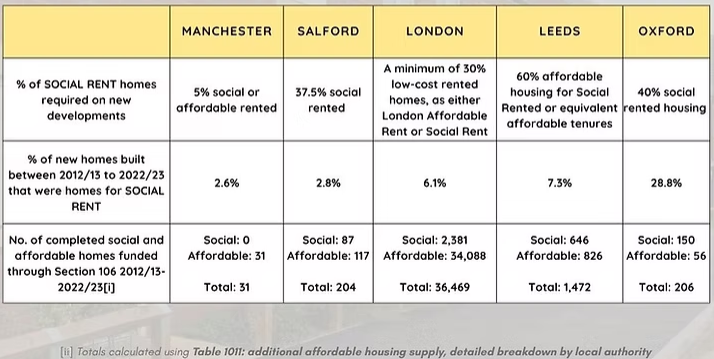
In addition to adopting a minimum requirement of social rent homes on all new housing developments of ten units or more, MCC have the power to set a percentage of social rent homes onsite of every new development, which then puts the onus on the developer to demonstrate through transparent viability if this is not possible. It also gives the local authority more weight in the decision.
This would help avoid viability loopholes that many local areas see when negotiating with big developers via Section 106/planning obligation agreements.
Developer contributions could also be used to retrofit existing poor quality/poorly insulated social homes on a case-by-case basis, which would, where implemented, mitigate damp and mould, bring down energy bills, and reduce carbon emissions.
4. Increased Planning capacity, transparency, and accountability
To maximise the delivery of ecologically sustainable social rent homes we need increased investment in funding for local authority planning departments and capacity building and training for local Planning Committees (something Oxford City Council have done to positive effect).
The Manchester Social Housing Commission are advocating in partnership with others across the country for the protection of community voice and the voice of elected members in planning decisions through the retention of powers of local Planning Committees.
These committees and our Planning Officers need training and capacity building to enable them to understand the complexity of planning issues; to hold developers to account for their obligations; and to implement and enforce planning conditions through to the end of a development process.
All too often developers negotiate their way out of the conditions placed on their planning applications citing a lack of profitability using ‘viability assessments’ compiled by expensive planning consultants.
This must end, and Commissioners continue to work with Lords and MPs to push Government to recognise that they must close the viability loophole and invest in local authority planning departments to ensure they have the expertise, time, and resources to hold developers to account.
Locally, Social Homes for Manchester are asking MCC for a new set of Planning Transparency pages on their website to enable communities to search by ward and at city-scale for local area data on housing need; active planning applications; and levels of social rent requested and delivered through both Section 106 and other forms of investment.
Manchester residents: please sign up to join the SH4M mailing list here.
Ward councillors: please make your pledge to demonstrate your support for a target of 30% social rent on all new developments of ten homes or more.
Manchester-based organisations: please demonstrate your organisation’s support for the six asks of the SH4M coalition – join the coalition here.
Our six asks:
- At least 30% social rent in all new developments of over 10 units.
- Stronger scrutiny and public accountability for the setting and enforcement of Section 106 developer obligations and to focus these contributions on the delivery of ecologically sustainable homes for social rent.
- Establish a Commission on social rent housing for Manchester.
- Develop a practical strategy for how to increase delivery of Community Led Housing and other community-led facilities including from donations of council-owned land.
- Develop a practical strategy for the renovation and transfer of empty homes into sustainable homes for social rent.
- Ensure all new build homes of any type or tenure are ecologically sustainable.
The Commission referred to under (3.) already exists and Commissioners are working hard to explore the evidence base and develop recommendations. You can read more about this at: https://www.socialhomes4mcr.org.uk/commission.
[i] Bramley, G. (2024: p.69), Housing Requirements in England Revisited. Heriott-Watt University https://pure.hw.ac.uk/ws/portalfiles/portal/113960635/Bramley_G._HOUSING_REQUIREMENTS_IN_ENGLAND_REVISITED.pdf
Introducing….

New additions to the CLASS staff team

Gemma – Fundraising and Communications
‘If you don’t ask, you don’t get’
I’ve never asked someone for a job before, but when my son started school last year, I knew I needed to do something I felt really passionate about. I could see the impact Community Savers was having for both individuals and communities, and I knew it was something I wanted to be part of. I nervously approached CLASS for a job in the summer of 2023, luckily they said yes, and I have been in post a year now!
I first came across the Community Savers idea in 2017 when I was doing some fundraising consultancy with a charity in Wythenshawe. The Community Savers idea was just starting up and the charity that I co-founded in 2012 supported the initial application to the Charity Commission for CLASS to become a registered charity and support the Community Savers movement. I continued to do some small pieces of work with CLASS and Community Savers, mainly fundraising support over the years.
I’m now working 1 day a week for CLASS, mainly in a fundraising role and supporting external communications. Even though I have worked with CLASS and Community Savers over several years, I’m still learning so much about the model, how everything works and constantly trying to keep up with all of the amazing work the network does. As well as working at CLASS, I still work at the charity that initially introduced me to CLASS (Participate Projects in Bradford).
Time certainly flies when you’re having fun, and this year has shot by. It’s been amazing meeting lots of the leaders, partners, groups and funders connected with CLASS and Community Savers and i’m looking forward to building on these relationships further. There are some exciting plans in place and I’m grateful to play a small part in developing and delivering these over the coming months.
Anne – Project Coordinator (Meredith Matters)

I came to live in Hulme in 1969. My roots are in dance, teaching and theatre adding community activities in 2009 quite by accident!. My heart is in Hulme and the surrounding area, we have seen so many changes both good and bad throughout the years, I hope I can make some difference to its future however small. Having unique experience and ties to the area has made working with its people a pleasure. Hulme has a good heart; it beats its rhythm again and again in me.
I have worked in the community on a number of different projects over the past 15 years mostly through a group called On Top of the World Project. This started out as a a co-produced 3 year project with The Royal Exchange using the arts as a tool of engagement working in high rise blocks in Hulme and Gorton. Then myself, Tina Cribbin and my son Christopher took over the reins putting on social events and a drop in for the Over 50s in the Aquarius area of Hulme. Happily the project has gone from strength to strength bringing in the wider community serving and advocating weekly, we even carried on through lockdown by delivering sessions in the gardens of Hopton Court tower block. On Top is now exploring incorporation as a CIO.
On Top has formed a partnership with one of the Community Savers groups called Aquarius Community Savers and they now run the savings club out of the On Top drop in on a Wednesday at the Aquarius Community Centre. With the closing of so many bank and building society branches, this is a really important local resource – allowing people to save any amount however small in a familiar local venue – it all adds up. So many of our group love saving now. We have a great committee and ever growing resident interest and commitment. Meeting CLASS has been a blessing. We have together traversed red tape and the sometimes challenging landscape of funding and public provider partnerships. We have accessed training and invaluable guidance supporting us in becoming marvellous!
Most recently we have developed a new partnership with Turn2Us and this is how I have come to work for CLASS supporting tenants to develop a new stage of the Ageing Well work this time at Meredith Court tower block through a project called Meredith Matters. Turn2Us are a breath of fresh air, bringing a genuine commitment to co-production with the community and experience and knowhow in financial inclusion and resilience. Our project is called Meredith Matters because we matter. Its not OK to just survive. We will be listened to and effect positive change in our community.
I love working with our diverse and everchanging landscape and people. We do a lot of laughing and enjoy our friendships, the old fashioned ways of checking up and supporting each other have re-emerged. They never really went away.
Spotlight on Miles Platting Savers
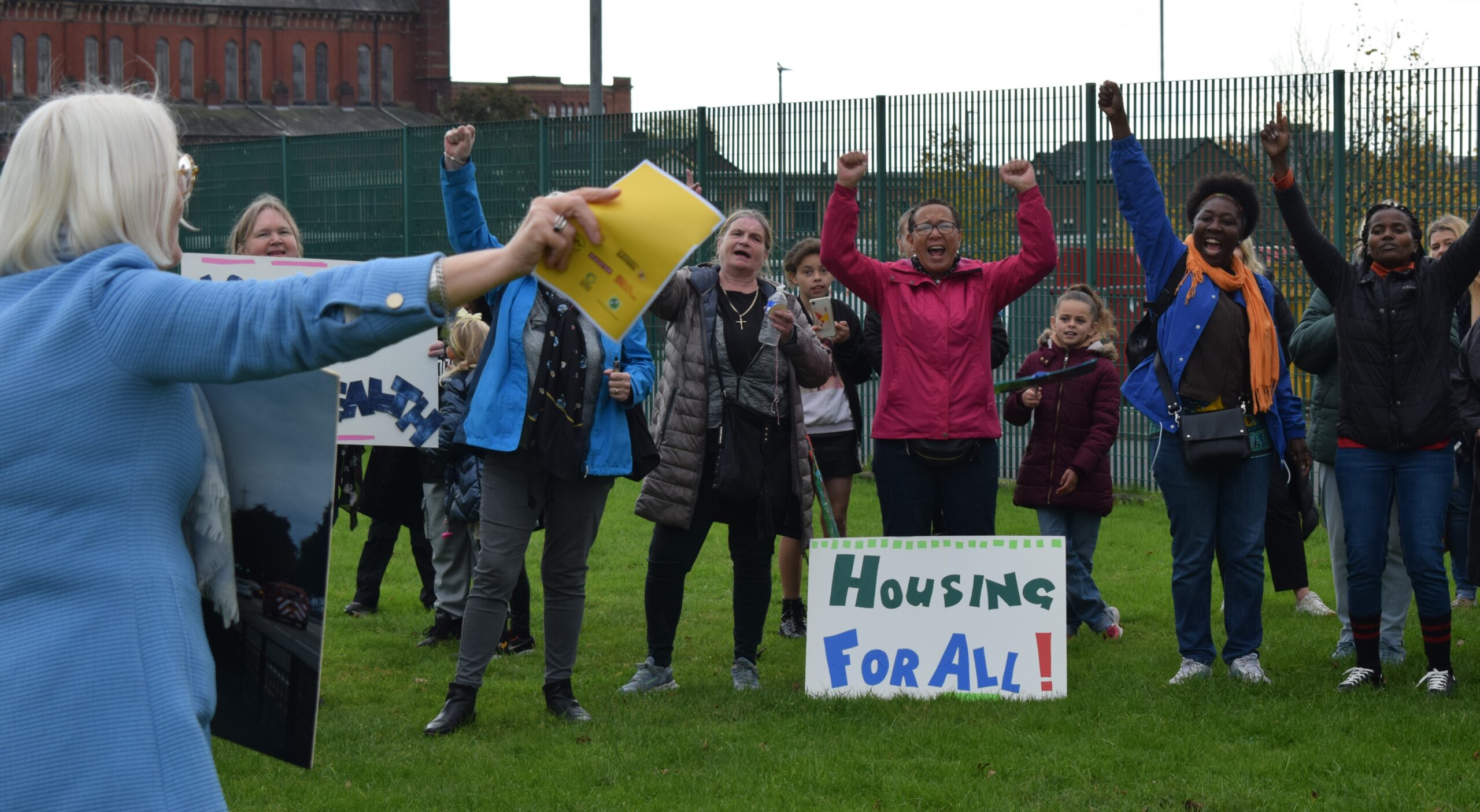
Read our interview with Dot, Committee Member at Miles Platting Savers, find out about one of the original groups in the Savers Network that is still going strong!

Can you tell us a bit about Miles Platting Savers? When did you start, where and how
often do you meet? How many members do you have?
About 5 years, we meet once a week at the coffee morning at the Church of the Apostles in
Miles Platting. We have about about 20 regulars and 30 savers in the group. We have a mixture of people who come to coffee morning, young and old.
As a group, what would you say are the main benefits for the individuals who save with
you?
It gives them a bit of extra cash to buy stuff they need, people are saving for uniforms,
Christmas and even holidays. I think most of the time you’re saving for something you think you
can’t have, then you realise if you save a little bit you can. There’s definitely a social side to it.
Most people are part of the coffee and some are visiting the social supermarket and they are
savers too. We definitely go in, have a cup of tea and have a chin wag and a catch up.
Has working with the other groups helped Miles Platting Savers to develop, learn, expand
or do things differently?
I think so, we see how other groups do theirs and then think if it works for us we can have a go.
I think it helps just to talk about what other groups are doing.
As well as the savings group, are Miles Platting Savers involved in any other community
projects and what are the impact of these?
We are members of MPCAN (Miles Platting Community and Age-friendly Network) – there’s loads of stuff going on thinking about the community building, the green spaces. I haven’t been to all the recent meetings due to my health but they let me know what’s happening.
What can we expect to see next from Miles Platting Savers next – does the group have
any plans for the future?
There’s a day trip planned to go to RHS Bridgewater so we can go there together in June. May
Fairweather from Talk about Money is going to come in to teach all ages from children to adults
how to save a bit and where to save. They are trying to get the people who use the community
shop (Social Supermarket at the Apostles) who have got kids to get involved, because I think if
you teach the kids the kids can teach the adults. I think that the Talk about Money sessions will
be a good way to get people to come in with the idea of getting the kids to teach their parents to
do a bit of saving.

To find out more check out the Miles Platting Savers page here: https://communitysavers.net/project/miles-platting-savers/
2023: A Year of Transformation and WoW!

Today we launch our Community Savers/CLASS 2023 Impact Evaluation!
Community Savers and CLASS are a cross-class alliance between a majority women-led poverty action network and a tailored professional support agency. We follow a learning-by-doing methodology (inspired by www.sdinet.org), where regular reflection and evaluation is critical. We conduct an annual impact evaluation between January and March each year; and this report captures our outcomes and learning during January to December 2023.
Here, we share some highlights.
VIEW OR DOWNLOAD THE REPORT
2023 IN NUMBERS

FINANCIAL RESILIENCE AND WELLBEING
The building blocks of the Community Savers movement are majority women-led and community-based savings clubs. Weekly savings collections create a space for our members to save small amounts while also accessing a range of other activities and information and discussing the issues facing their local community.
Here’s a snapshot of progress in 2023.


STRONGER COMMUNITIES
Leadership development and community-building is at the heart of the Community Savers methodology starting with the financial resilience and wellbeing of our individual members, moving up to confidence and skills development among group committees leading to stronger community associations, and networking community associations together for a stronger collective voice on the issues affecting their neighbourhood and beyond. We are proud of the solidarity and collective purpose and voice that emerged at local levels and across the whole network in 2023!
Women of Wythenshawe = WoW!
Women of Wythenshawe brought together 37 local women leaders from ten different community and service user groups across in 2023. The women are representing a broad range of interests and identities including Carers; SEND parents; women with autism and learning disabilities; women seeking asylum or recently granted leave to remain;survivors of domestic abuse; and women from diverse ethnic backgrounds.
Over the first 18 months, leaders have invested significant time in building trust and confidence and skills development, including through bi-lateral exchange visits between the groups, extensive storytelling and listening work, and the development of shared values. Women have coalesced around four priority areas for community action on gendered poverty in Wythenshawe (and Manchester more widely). These are:
- improving the way that public sector workers identify and respond to domestic abuse;
- achieving a higher ratio of ecologically sustainable social homes;
- building the capacity of Wythenshawe schools to provide good quality SEND support; and
- supporting the development of women-led social enterprise

“CLASS’s inclusive approach to convening the WoW network has been commendable. By actively involving women leaders from diverse backgrounds and communities, CLASS has created a platform where all voices are heard and valued.” WoW Support Worker
Miles Platting Community & Age-friendly Network (MPCAN)
MPCAN first formed in 2019 with support from CLASS following discussions with community groups about how residents did not fully understand the local developments taking place under a PFI initiative and how they were anxious about the future.
“MPCAN at the beginning had a formal purpose to facilitate and promote community action. The meshing of older and newer populations, lack of facilities, swimming pool and library- there was a sense that this was a bit bleak, so we needed to cooperate.” MPCAN Leader
MPCAN currently has three action groups and we share some of their brilliant achievements in 2023 below.
Climate Action: Members organised “Our Green and Pleasant Land” Climate Resilience Pageant in July and were delighted to then be one of the grantees for the Greater Manchester Green Spaces Fund. Funding was awarded to develop a wildlife corridor in Miles Platting with support from Dr Jenna Ashton, University of Manchester. Plans for the wildlife corridor are well underway. Project lead Suzanne Walton from Groundwork is carrying out ongoing consultations with residents around the four key sites to determine what kinds of additions they would like to see, from trees to wildflowers to hedging.
St. Cuthberts Communities Together: MPCAN have developed a partnership with the Parochial Church Council of St Cuthberts to re-imagine the church site working with Locality and Participate! as project managers. A community consultation has been carried out and initial concept designs developed, the Bishop of Manchester has put his support behind the project, and MPCAN and PCC have now applied to register a new charity to manage the project called St Cuthberts Communities Together. The vision includes a worship space, NHS joint services centre and a multipurpose social centre with a small amount of social housing. These were some of the infrastructure and services that were supposed to be delivered under the original PFI neighbourhood plan.
“The enthusiasm, the skill set that is being brought to meetings, the funding that has been attracted to the wildlife project and now for St Cuthbert’s. We have built up now into being a serious project that people are willing to fund.” MPCAN Leader
Social Homes for Miles Platting: MPCAN launched this new campaign in October, with a focus on claiming plots of public land that were earmarked for facilities and services for community benefit under the PFI. The current focus is a plot of land that was supposed to host a joint services centre and community hub. Over 200 people attended their consultation day which was followed by a march to the site and a demonstration on 28 October 2023. The Executive Member for Housing will meet residents to discuss the plot in June 2024.

“We look out for each other – if someone is poorly or down, we make sure they are ok. I like to have a sense of achievement – but that we’ve achieved together. It feels good when we get these small wins, and now we are going for much bigger ones! Twenty years ago, we wouldn’t have dared, we just fought for people to get their repairs done. Now, we are aiming high. And it’s good and it feels good. And to be honest, sometimes it goes over my head, but if I don’t understand stuff I say so, and I can also look on the internet now.” MPCAN Leader
Community design & build
A tenant-led community space in Hulme: Following two years of advocacy and partnership working driven by tenant leaders with Aquarius Community Savers, One Manchester Ltd have agreed to renovate a ground floor three-bedroom apartment into a community space. The space aims to combat social isolation and mental health challenges experienced by older and vulnerable people at Hopton Court tower block in Hulme, Manchester. The renovation is set to commence in summer 2024. Cornbrook Medical Practice evidenced during our research in 2021 that one third of Hopton Court’s tenants were suffering from anxiety and depression and the neighbourhood has some of the worst health inequality statistics for Older People living in Deprivation in England.
Beyond the St Cuthberts redevelopment, Community Savers & CLASS have continued to support two further community design and build projects in 2023. Leaders across the network have learned a lot from these processes including a large dose of patience as each initiative has experienced significant delays!
A women-led community space in Wythenshawe: Participatory design work to renovate a derelict Caretakers flat into a women-led social space began in 2019. Progress was slow due to COVID and long delays within the internal processes
of acquiring a lease from the Methodist Church. After agreeing the Head Terms for the lease in July 2022, Mums Mart and CLASS have learned a great deal from two years of further negotiation! We are delighted to have recently signed the lease and work is due to commence in June 2024.

The completed project will create a free to use community space for women’s groups across the Wythenshawe area for at least ten years. Our thanks go to the National Lottery Community Fund without whose support and patience this project would not have made it to the finish line! We would also like to
thank the Smallwood Trust and the Women of Wythenshawe assessment panel who
approved a small uplift grant to cover recent cost inflations.
MAKING MANCHESTER FAIRER

According to data collated by Shelter, there were 15,268 households on the waiting list for social housing, 3,926 children in temporary accommodation, and 7,773 people recorded as homeless in the City of Manchester in 2023. Yet, between 2012 and 2022 only 506 out of 23,364 new build homes were for social rent. Together with partners, we have formed a coalition of ten VCSE and activist/residents’ groups called Social Homes for Manchester which is making the following six requests of Manchester City Council as they prepare the new Local Plan for the city:
- At least 30% social homes included in all new developments of over 10 units to be enacted in local policy and enforced through the setting and enforcement of section 106 obligations.
- Stronger public accountability and scrutiny for the setting and enforcement of developer obligations to build new social housing.
- Establish a Commission on Social Housing for the City of Manchester.
- Develop a practical strategy for the promotion of Community Led Housing.
- Develop a practical strategy for the renovation/transfer of empty homes into homes for social rent.
- Ensure all new developments are climate and nature friendly.
ASK YOUR COUNCILLOR TO PLEDGE THEIR SUPPORT

Bishop of Manchester David Walker has agreed to chair the new Manchester Social Housing Commission. Our asks and the Commission itself are supported by the Deputy Leader and Executive Member for Housing at Manchester City Council; and we are in the process of recruiting Commissioners. The Commission will remain rooted in local campaigns and the process itself is aimed at mobilising resident/community coalitions across the city to hold local, regional and central government administrations to account for the recommendations that are developed. The other members of the coalition include: GM Community Led Homes Hub; GM Tenants Union, Greater Together Manchester, Shelter GM, Mustard Tree, and Steady State Manchester. We are excited to have also recently joined the national Homes 4 Us alliance.
FUTURE DIRECTION
In the main report you can also read reflections from the Community Savers leadership and our partners on progress, co-governance, and what we have learned about community action, as well as our plans for the year ahead, so don’t forget to:
VIEW OR DOWNLOAD THE REPORT
Excerpts from ‘What have we learned?’
“Community action is easier with the support of a whole network.”
“Community action brings people together, it can result in real change that is actually needed. Its powerful as it comes from within our communities as we are the experts we know what will work and what is needed. It feels really good when change happens from within our communities – it can bring pride and improve wellbeing and confidence. Community action can also be really uplifting and fun.”
“I’ve learned about the way the council operates… both the politicians and the officers.”
“The importance of bringing the groups together so we have a bigger, louder, voice. The more of us, the more voice we have, the more the decision makers have to listen.”
“I have also learnt a lot from some mistakes we have made e.g. don’t go to planning meetings and trust that the council is going to work with us with the openness that
we offer them.”
“Bringing together a knowledge of who to go to: that kind of intelligence is important… we’re getting a checklist of where is useful to go to.”
Excerpts from ‘Reflections on co-governance’
“I think it’s really good the way we co-govern and share the decision making. We feel like we
are listened to and more involved. We get to make them choices… We get all the reports and everything we need. If we can’t attend a meeting, we get all the updates.”
“It’s working well: everyone is happy with the decisions because it is equal – we have lots of
opportunity to talk about what’s going on and if we agree. Everyone’s voice is heard.”
“I have really loved representing Savers at the trustee meetings. I have learnt a lot about all the groups that CLASS supports and how the charity is developing. The leadership team is a great way of making shared decisions.”
“We work well with CLASS…You’ve taken time to get to know us all individually and you give us the support we need. Like me, people telling me I lack confidence. But I can do it. I’m good at what I do. I say it as it is and not everyone can cope with that, but CLASS has never had a problem with this. They take a personal approach they make sure you are ok that is all part of it as well. It’s like we are a big family.”
Introducing…
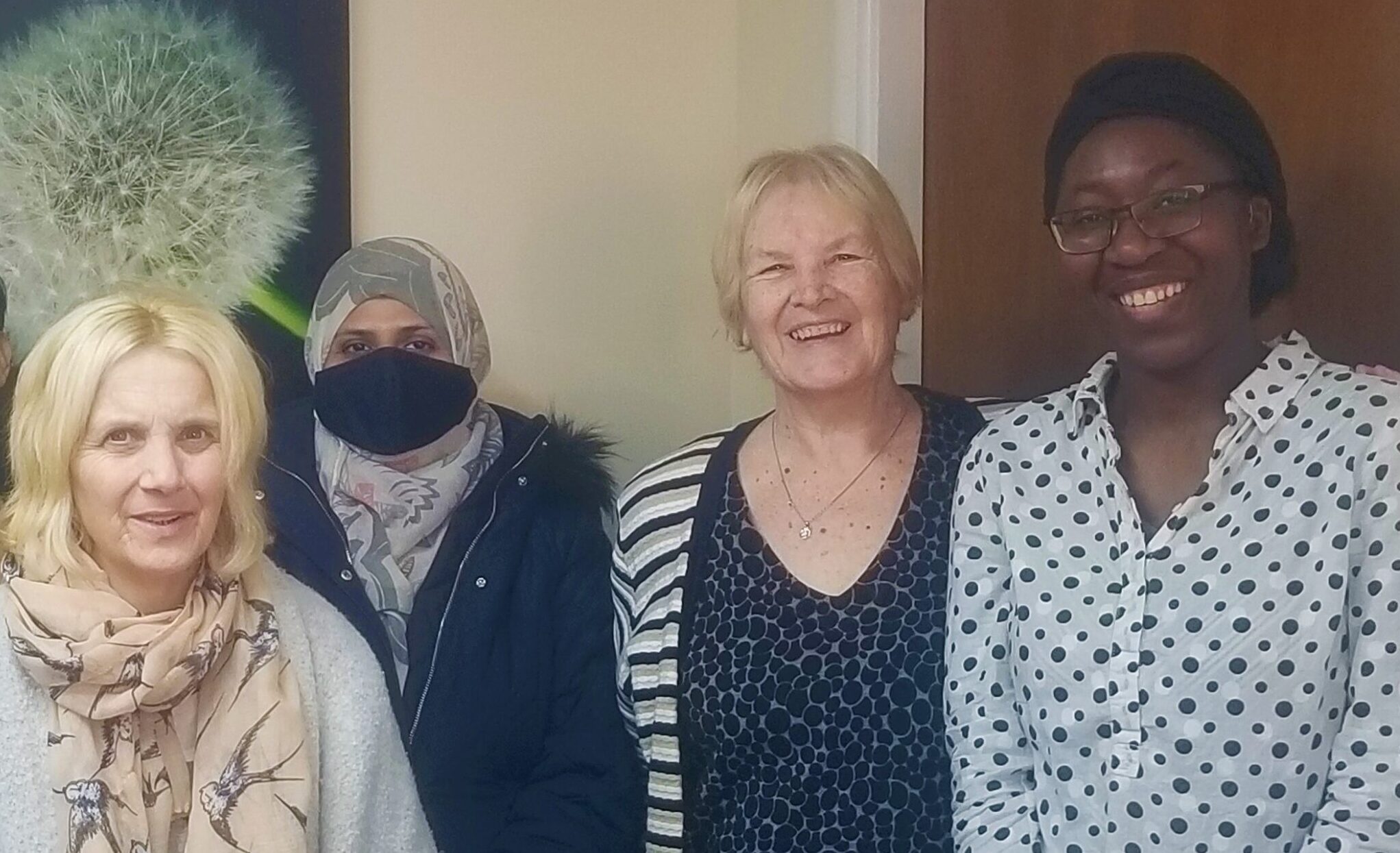
CLASS is delighted to have been able to develop our staff team throughout 2023! We welcomed Kate Parsons, our new Operations Manager, in March, and Fathima Naseer the new Women of Wythenshawe Admin Assistant in July; while our brilliant intern Ieva Pojuner was promoted to Neighbourhood Networks Coordinator in September. We asked Fathima, who is also Treasurer at Dandelion Savers (header image), and Kate (below), to share a few words about themselves, and their experience of joining the CLASS team and working with Community Savers and WoW…
Fathima:
Getting a job with CLASS and Women of Wythenshawe has been very emotional for me!
I came to the UK from Sri Lanka in 2011 with my family, and for a long time I was just at home being a housewife and mum. I had never worked in my life and I was always at home, but during COVID I saw a message from The Dandelion Community saying they needed volunteers. I texted them and Rev. Kate Gray from Dandelion asked me to come in the same day. So that’s when I started volunteering for 3 years at Dandelion foodbank.
Over time, I was able to take on more responsibility with the Foodbank, and I started managing the food bank vouchers and paperwork. Kate asked me, ‘what kind of job would you like if you could have a job?’ I said ‘paperwork – that’s what I like doing’, and she said ‘that’s called admin work’, – so that’s when I knew what it was called!
Then at Dandelion in January, we started up a new group called Dandelion Savers and this was really helpful for me because I didn’t ever use money before, my husband managed all the finances and looked after everything very well.
Since I became Treasurer at Dandelion Savers it was so good for me because I learned how to use money, how to manage money, going to the post office and using an ATM – I had never used those things, or even at the shops, or going on the bus, I had never used money. I never travelled on my own!
So, I have learned so much, and then this year, I was so pleased to get a job as Admin Assistant supporting the Women of Wythenshawe network!
The first two months have been really interesting: I have learned many new things and I am learning more every day. I had a bit of anxiety about some things like making bookings and sending emails but then I do it and that gets easier because I am just doing it. And I am talking to people on the phone all the time. I am still worried about doing meeting minutes but the other staff at CLASS are helping me learn this new skill.
It’s unbelievable to me, I thought I was never going to work in my life I thought I would be a housewife for ever! But my children started asking me questions like “mum, why do you not go to college; why are you not working?” They see their friends’ mums working so they wonder. And now, I give them £10 from my salary as pocket money and it makes me so happy! And they are already good savers – they save £5 for savings, £5 for snacks!
Kate:

After seven years of working at a mental health charity in an operations role I was looking for a
new challenge. A colleague recommended that I look at the role at CLASS and I read with
interest about the background of how the organisation had begun. The idea that these
groups are formed and driven from the ground up really appealed to me. Co-production is a
much talked of activity but few organisations achieve it. CLASS and Community Savers are doing an excellent job of working together to collaboratively create and strengthen groups and networks
that are representing community priorities and needs and with mutual respect are delivering
successful outcomes.
Since starting in my role as Operations Manager at the beginning of March 2023, I have met all the affiliated Community Savers groups and networks and have been impressed with their commitment to improving their communities and raising awareness of issues they have identified as important for their areas. Reflecting on my first six months in post, I have learned a lot from an amazing team of leaders who are addressing an impressive range of issues including housing, climate change, the cost of living and surviving on a low income. Their projects include the development of community hubs, green spaces, food banks and crisis funds. Women-led groups come together to share their knowledge and skills to make improvements that have an important impact in their local communities.
I have attended meetings where people have spoken passionately about wanting to help others and bring about the change that they want to see. After attending the annual retreat in July this year, I can really see the power that comes from bringing people together with similar aims to support and uplift each other. The network is stronger together and the support and skills offered are impressive. The wide range of activities is exciting and I am looking forward to the opportunity of supporting the leadership with their aims and objectives in the months ahead.
Women in the lead: why retreats matter for networked community action

Sophie King, Development Manager at CLASS, explores what the Community Savers-CLASS alliance has learned about the importance of reflection and retreats for women’s community action.
I’ve said it before, and I’ll say it again: Explore any urban neighbourhood – seek out its craft groups, its over 50s exercise classes, its food banks, parent groups, and meal clubs – and there you will find amazing women.
Women have always played a critical role in community action in the UK (and across the world). Since the onset of austerity policies in 2010 which has reduced spending on public services and social support, women have been at the forefront of the battle to provide a safety net for the most vulnerable in our society. And now COVID.
The gendered nature of community action usually goes unrecognised. It is almost always unpaid, and the cost of activities are frequently shouldered by communities themselves.
This presents us with a very real challenge. The Community Savers approach amplifies and builds upon the expertise and resilience of grassroots women leaders to make change happen. But this creates additional demands on women who are already shouldering many of their own community, family and work pressures.
Yet, being in the network also builds resilience and enables effective strategies to spread. Throughout the pandemic, savings group leaders have been able to fall back on their network for moral support, ideas and information, or just to offload when things get tough. Crisis resources have been shared between groups – when there is a surplus in Miles Platting, Manchester, women in Wythenshawe have been able to collect and redistribute in the south of the city. Before COVID, groups were travelling to learn from each other’s projects and approaches, where a savings group set up in one place, a food project would replicate in another.
Retreat and reflection
Grassroots women leaders need time away from firefighting to have the space to take a breath, reflect on their achievements and challenges, and share experiences with each other.
Taking this time for reflection enables them to take stock, recognise all that they have achieved, re-energise and re-strategise.
Some movements and initiatives can do this in-situ, but it is very different in the context of women providing crisis support in low-income urban neighbourhoods.
Women in the lead
Building on 30 years of SDI’s learning by doing, the Community Savers-CLASS alliance are attempting to build a genuinely alternative form of community-professional partnership.
Our work together is led by, for, and with grassroots women but protecting that principle requires constant dialogue, reflection and renegotiation. The issues we must address jointly are challenging and tension is the norm. One size of professional support does not fit all groups as one of our leaders pointed out the other day. Equality of access to support is also important.
We need to make collective decisions about how workers spend their time, what resources are raised for which activities, and how they are distributed. But as the network grows the governance demands become greater and more complex. Under what conditions should community leaders be remunerated? How are funding proposals developed? Who represents who under what circumstances? Which processes are going to secure transparency and accountability and avoid tokenistic solutions?
And: where to find the time and space to have these discussions without needing to rush to school pick up, hospital appointments, food collections, or tonight’s campaign meeting?
September 2021
In September 2021, Community-Savers & CLASS will be going on a 2-day retreat in North Wales. We would like to enable 4 amazing women from each of the Community Savers affiliate groups to attend.
We need to raise an additional £1,000 to make this possible. If you can, please help us to reach our target by making a donation.
Thank-you.
